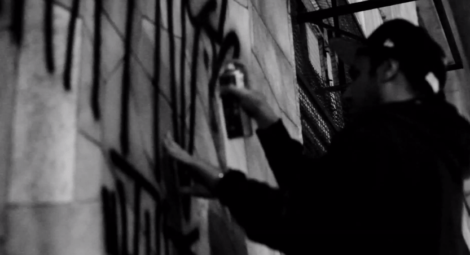- play_arrow
Itch FM – Dedicated to Hip Hop

Brazil; South America’s largest country known to the world for its colourful upbeat carnivals, exhilarating people, brilliant footballers, beautiful beaches and hip hop like honeys.
An exciting and vibrant place filled with an abundance of natural resources and one of the world biggest emerging economies, but don’t let the orange mist fool you. Brazil has a high level of impoverishment and ranks amongst the world’s highest nations in the Gini Coefficient Index of inequality assessment. This means that the richest 10% of the population receive 42.7% of the nation’s income, while the poorest 10% receive less than 1.2%, a blatant level of socio inequality.
The level of poverty is impossible to sweep under the carpet and inevitably across the country, cities such as Rio de Janeiro are filled with what are known as Favelas; an urban slum or ghetto; illegal squatter settlement.
Rio’s geographical landscape is quite unique; part of the city is reign by the costal line and the other by mountains which tower over the cities background. At the hills, favelas dominate the scenery. From these same favelas the hip hop scene in Brazil was born; during the 1980’s favela streets parties, DJs played the latest American Funk and Soul records to Afro-Brazilian crowds, when the first hip hop records came out, they naturally made it into the rotation becoming increasingly popular, particularly in Rio and São Paulo.
There are amongst 600 favelas in Rio, one of the most infamous is Vigário Geral known to some as the ‘Brazilian Bosnia’, and to others as the ‘Headquarters’ as it is where all gang commanders meet. Poverty, lack of opportunity and education predominantly leads to the formations of gangs with drug dealing and gun trafficking at the heart of their operations.
The life of the drug lord is very appealing for most youth in the favelas as they see this as the means to end their economic instability and a way out of the slum. Not all view it this way, there are many who are hardworking law abiding citizens who want to make their way through honesty and dignity.
However the life of a drug dealer in a favela is not all but sex, money and luxury, on average the life expectancy of a “Fa- villain” drug dealer is 14 to 25. Is no secret that police corruption contributes to the problems there, majority of the drugs and guns come from corrupt officers alongside the extortion of criminals with their own PAYE tax.
On August 1993 the community of Vigário Geral suffered a revenge attack when 4 corrupted police officers were shot and killed by drug dealers after a long haul of extortion. Police stormed the favela during the day killing 21 innocent people from the community amongst them the elderly, women and children.
The community of Vigário Geral was in pain and indignation, very much under the gloom of a grey cloud but not all was over as the light pierced the darkness and gave birth to Afro Reggae; a non-profit organization that aims to take young favela residents off the streets and away from drugs through the means of music.
The music is a hybrid of traditional Brazilian dance music fused with hip-hop and reggae. Afro Reggae’s ultimate goal is to offer young favela residents something to do other than join the increasing ranks of drug dealers. In the face of adversity, the Afro Reggae movement offers hope and leadership to young Brazilians. Afro Reggae movement has dispersed with partnerships present in Colombia and the U.K.
Such is the presence of police corruption that the Hip Hop group Pavihão got their name from the exact location where about 100 convicts were murdered by police inside the Carandiru jail. Very much of the Hip Hop culture in Brazil today reflects the life of many in the Favelas.
In São Paulo the rap scene is fiercely political in nature and has been it’s tradition. In fact the most famous hip hop crew in Brazilian history the Racionais Mc’s who came up in the late 80’s rapped about the struggles of Favela life, often with a revolutionary message. The Racionais MC are still embarked on their musical journey with a new album due out 2013.
Keeping within the scene of São Paulo, OGI acclaimed 2011 album Crônicas da Cidade Cinza (Tales from the Grey City) was composed of 19 song-stories about life in Sao Paulo depicting the struggles and battles of the big city. Another rapper known as CRIOLO has been in the scene from day one, since he is an ‘ole g’ expect to hear poetic justice in his writing keeping it real and very social conscious.
One of Brazil’s artist who is breaking into the mainstream scene is EMICIDA and has featured in soundtracks for Max Payne 3. He has performed in London in 2012 and you should expect to see and hear much more from him.
Moving on, FLAVIO RENEGADO reps the city of Belo Horizante in the Brazilian interior giving an original feel to his music and one to def keep your ears out for.
Overall the hip hop culture has a strong presence in Brazil and generally music is used as an outlet of hope and peace. We as the hip hop community should bare this in mind and expose the realities of what many go through so that by the means of Music we can lead a peaceful revolution towards a more equal level of living.
Please check out the links BELOW!!!
Peace.
Ogi – Noite Fria https://www.youtube.com/watch?v=0hJc_tOzs50
Emicidia Freestyle Live https://www.youtube.com/watch?v=x0Zt5leBQJc
Criolo Doido – Ainda Ha Tempo https://www.youtube.com/watch?v=j_kjt-ESG8s
Flavio Renegado – Minha Tribo e o Mundo https://www.youtube.com/watch?v=ooD5-PjkYo0
Brazil Police Corruption and brutality – https://www.youtube.com/watch?v=RUQL-8FB2tw#
http://playingforchange.com/journey/musicians/109/AfroReggae
Written by: Medina

